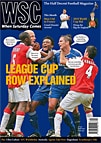 Neil Rose reports on how owners of England and Man Utd shirts may get a refund
Neil Rose reports on how owners of England and Man Utd shirts may get a refund
It came as no surprise to many who have shelled out for the latest bit of shiny polyester to learn in 2003 that the prices of some football shirts had been illegally fixed. After a three-year investigation, the Office of Fair Trading fined ten organisations – including the FA and Manchester United – a total of £18.6 million for ensuring that the cost of various England and United Umbro shirts stayed at around £40. These included the England kits worn at Euro 2000 and the 2002 World Cup, and United’s “reversible” centenary specials – replica shirts can now be bought at half the price or less. Umbro and JJB Sports – where Dave Whelan is executive director – took the brunt of the fines, although the amounts reduced a little on appeal (United’s to £1.5m).